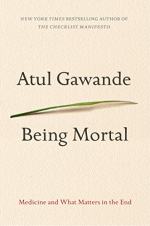
|
| Name: _________________________ | Period: ___________________ |
This test consists of 15 multiple choice questions and 5 short answer questions.
Multiple Choice Questions
1. What does Gawande say Ronald Dworkin says is the heart of a meaningful life?
(a) To be free from fear.
(b) To be well respected by good people.
(c) The ability to be the author of your own story.
(d) To have material stability and comfort.
2. What does Gawande say is most important about the end of Jewel Douglas’ story?
(a) She was alert to the end.
(b) It was painless.
(c) She decided how it would go.
(d) It was brief.
3. What does Gawande say being mortal is about?
(a) Knowing the spirit.
(b) Being grateful for life.
(c) Working with the constraints of biology.
(d) Transcending death.
4. What does Gawande say Jewel Douglas’ death showed him?
(a) That dignity in death takes a lot of work and planning.
(b) That we are not powerless in the end.
(c) That sometimes doing nothing is better.
(d) That family is important in dying.
5. By what rate did the death rate decline at Chase, after the introduction of animals?
(a) 20%.
(b) 42%.
(c) 38%.
(d) 15%.
6. What does Gawande say doctors have to do as people get closer to death?
(a) Resist the urge to toy with their health.
(b) Weigh the cost effectiveness of each treatment.
(c) Find the most drastic cures and treatments.
(d) Consider the effect of treatment on their family units.
7. When does Gawande say developments in the field of palliative will provide cause for celebration in medical circles?
(a) When they spread to other fields of medicine.
(b) Every time they touch a patient.
(c) Whenever they improve the quality of someone’s life and death.
(d) When they apply to every patient.
8. How does Gawande characterize the onset of treatment for his father’s tumor?
(a) As a test for what he had learned about mortality.
(b) As a tragedy that struck too early.
(c) As an opportunity to practice what he had learned to preach.
(d) As a punishment for not having taken better care of his father.
9. What does Jewel Douglas say is her lifeblood?
(a) Seeing friends.
(b) Eating good food.
(c) Holding her grandchildren.
(d) Holding her husband.
10. Why does Dave Galloway say he does not want to take his pain medication when his cancer is troubling him?
(a) He says that it takes him from his wife and child.
(b) He says that it feels like a defeat.
(c) He says that it makes him panic to be so close to death.
(d) He says that it makes him depressed.
11. Where does Gawande say five of the world’s fastest-growing economies are?
(a) Africa.
(b) Asia.
(c) The Middle East.
(d) South America.
12. What is the ars moriendi?
(a) The art of consoling.
(b) The art of teaching.
(c) The art of medicine.
(d) The art of dying.
13. How does Gawande characterize the phase of cultural development we are in, with regard to care for the sick and dying?
(a) More institutional.
(b) More spiritualized.
(c) Transitional.
(d) More medicalized.
14. Where does Gawande say his father’s pains began?
(a) In his neck and arm.
(b) In his eyes and ears.
(c) In his airways.
(d) In his back and hips.
15. What did Gawande see stacked along the river bank when he and his guide set out to dispose of his father’s ashes?
(a) Mourners.
(b) Wood.
(c) Bolts of fabric.
(d) Bodies.
Short Answer Questions
1. What definition of courage does Gawande arrive at, after considering Plato’s dialogue “Laches”?
2. What is moksha?
3. How much of Medicare spending goes to the 5% of patients who are in their last year of life?
4. How many spoonfuls of Ganges water did Gawande drink, as part of his father’s funeral service?
5. What does a patient base their impression of pain on, according to researcher Daniel Kahneman?
|
This section contains 645 words (approx. 3 pages at 300 words per page) |

|




